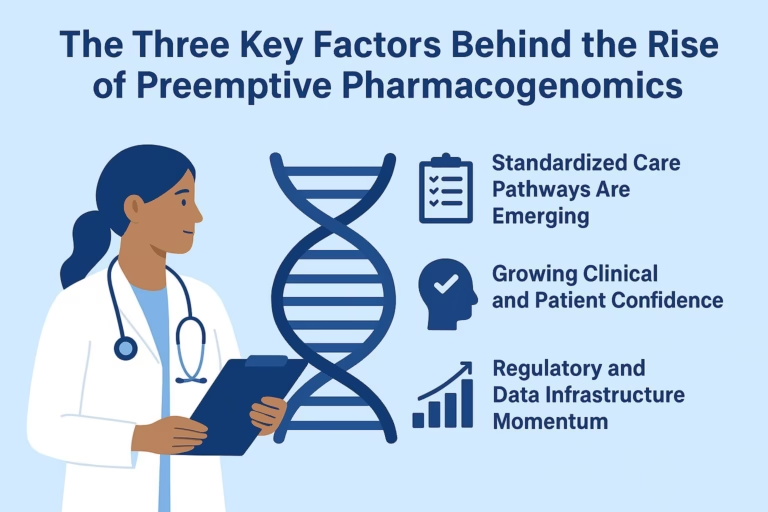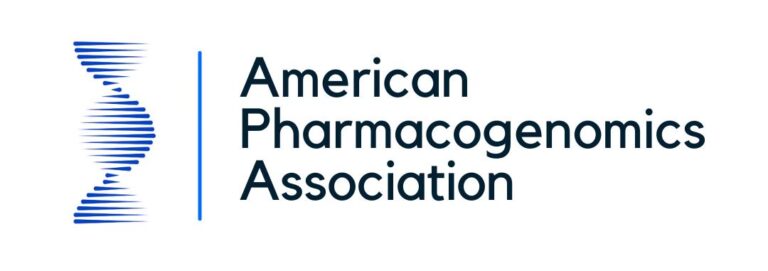Did you know that approximately 50% of patients do not respond to their prescribed medications as expected?
This startling statistic sheds light on the challenges healthcare professionals face when determining the most effective treatment plans for individuals. However, the emerging field of pharmacogenomics is changing the game.

Key Takeaways:
- Pharmacogenomics is the study of how genes influence an individual’s response to medications.
- Genetic variations can impact drug metabolism, leading to variations in efficacy and side effects.
- Pharmacogenomic testing can provide personalized insights into medication response and guide treatment decisions.
- Over 80 medications already have prescribing recommendations based on pharmacogenomic testing.
- The future of pharmacogenomics holds promise for the development of personalized drugs tailored to an individual’s genetic makeup.
Understanding Pharmacogenomics and How It Works
Pharmacogenomic tests play a crucial role in predicting an individual’s response to medications by analyzing genetic variants within their DNA. These tests provide valuable insights into how specific genetic variations can influence drug response and metabolism.
For instance, certain genetic variants may indicate that a protein involved in drug metabolism is unable to break down a medication effectively. As a result, this can lead to increased drug levels in the body, potentially causing adverse effects. Conversely, other genetic variants may indicate that a protein is metabolizing a medication more rapidly than expected, leading to reduced drug effectiveness.
Through the analysis of these genetic variants, pharmacogenomic (PGx) tests enable healthcare professionals to gain a deeper understanding of how an individual may respond to specific medications. By assessing the genetic profile, PGx tests can guide healthcare professionals in tailoring treatment plans and selecting medications that are likely to be safe and effective for the individual.
It is important to note that pharmacogenomics is not a one-size-fits-all approach. Genetic variations can vary significantly between individuals, contributing to differences in drug response and efficacy. This personalized approach to medicine allows for more targeted and precise treatment options, optimizing patient outcomes.
Pharmacogenomic tests provide valuable insights into how an individual’s genetic makeup can impact their response to medications. By analyzing genetic variants, healthcare professionals can select the most appropriate medications and dosages tailored to each individual’s unique genetic profile.
Genetic Variants and Drug Response
Genetic variants are variations in DNA sequences that can occur naturally in individuals. These variations can impact the function of specific genes involved in drug metabolism and response.
By identifying genetic variants through pharmacogenomic testing, healthcare professionals can gain insights into how an individual’s body may process and respond to specific medications. This can help guide treatment decisions, ensuring that the medications prescribed are safe and effective for the patient.
Pharmacogenomic Testing Process
The process of pharmacogenomic testing involves several steps to determine an individual’s genetic variations and their potential impact on drug response.
- Sample Collection – A sample, often saliva or blood, is collected from the individual.
- Genetic Analysis – The DNA in the sample is sequenced and analyzed to identify specific genetic variants.
- Data Interpretation – The identified genetic variants are compared to known associations with drug metabolism and response.
- Reporting – The results of the pharmacogenomic test are reported to the healthcare professional, who can use this information to guide treatment decisions.
By following this process, pharmacogenomic testing provides valuable information that can aid healthcare professionals in prescribing medications that are tailored to an individual’s genetic makeup, optimizing the potential for a positive treatment outcome.
Now that we understand how pharmacogenomic testing works and its implications for drug response, let’s explore the various applications of pharmacogenomics in personalized medicine in the next section.
Applications of Pharmacogenomics in Personalized Medicine
Pharmacogenomics has revolutionized personalized medicine by offering targeted treatment options based on an individual’s genetic makeup. The applications of pharmacogenomics extend across various therapeutic areas, including depression, cancer, and heart disease, among others.
Healthcare professionals now have access to over 80 medications with prescribing recommendations based on pharmacogenomic results. By analyzing an individual’s pharmacogenomic profile, healthcare professionals can make informed decisions regarding medication selection and dosing. This personalized approach allows for more precise and effective treatment options, tailored to the individual’s unique genetic characteristics.
For instance, consider the field of oncology. Pharmacogenomic testing can provide crucial insights into a patient’s likelihood of responding to specific cancer drugs. By identifying genetic variations that impact drug metabolism or response, healthcare providers can select medications that are more likely to be effective, increasing the chances of successful treatment outcomes.
In addition, pharmacogenomic testing has proven valuable in guiding medication choices for mental health disorders such as depression. By considering an individual’s pharmacogenomic profile, healthcare professionals can tailor antidepressant therapy to maximize effectiveness while minimizing potential side effects.
The impact of pharmacogenomics on precision medicine is undeniable. The ability to incorporate an individual’s genetic information into treatment decisions allows for a more targeted and personalized approach to care. This shift from a one-size-fits-all model to precision medicine has the potential to improve patient outcomes and enhance the overall quality of healthcare.
Prescribing Recommendations in Pharmacogenomics
To illustrate the practical applications of pharmacogenomics in personalized medicine, here is a table showcasing different medications with prescribing recommendations based on pharmacogenomic testing:
| Therapeutic Area | Medication | PGx Recommendation |
|---|---|---|
| Depression | Escitalopram (Lexapro) | Reduced dose if CYP2C19 poor metabolizer |
| Cancer | Trastuzumab (Herceptin) | Test for HER2 gene amplification for efficacy |
| Cardiovascular Disease | Clopidogrel (Plavix) | Consider CYP2C19 genotype for dosing |
As shown in the table, pharmacogenomic testing can provide specific recommendations for medication dosing and selection based on an individual’s genetic profile. These insights enhance the precision of treatment plans, minimizing the risk of adverse drug reactions and optimizing medication efficacy.
With the continued advancement of pharmacogenomics and its integration into clinical practices, personalized medicine is poised to become the standard of care. The ability to tailor treatments to an individual’s genetic profile holds the potential to transform healthcare, providing patients with more effective and safer medication choices.
Limitations of Pharmacogenomic Testing
While pharmacogenomic testing holds great promise, it also has its limitations that need to be acknowledged and addressed. These limitations can affect the accuracy and applicability of the test results, impacting the overall effectiveness of personalized medicine. Some of the key limitations include:
- Predictive Nature: It’s important to recognize that pharmacogenomic testing provides predictions rather than definitive answers. The results are based on analyzing genetic variants associated with drug metabolism but do not guarantee the exact response an individual will have to a medication. Other factors, such as lifestyle, age, and organ function, can also influence medication response, which the testing may not fully account for.
- Limitations in Gene Coverage: Most pharmacogenomic tests focus on a limited number of genes and variants that are strongly linked to specific drugs. While these tests provide valuable insights, they may not capture variations in all genes related to drug metabolism. This limited gene coverage can impact the accuracy and comprehensiveness of the test results, potentially missing important genetic factors that affect medication response.
- Lack of Diversity: The lack of diversity in study participants used to develop PGx testing algorithms is a significant limitation. The majority of the research has been conducted on populations of European ancestry, resulting in limited applicability for other ethnic groups. Genetic variations related to drug metabolism can vary among different populations, highlighting the need for more diverse representation in research and testing.
It’s crucial to consider these limitations and approach pharmacogenomic testing as a complementary tool rather than a definitive solution. While the test results can provide valuable insights, they should always be interpreted in conjunction with clinical judgment and other relevant factors.
The Importance of Further Research and Development
Addressing the limitations of pharmacogenomic testing requires ongoing research and development. Efforts should be made to expand the gene coverage in testing panels, incorporating a broader range of genes related to drug metabolism and response. Additionally, the inclusion of diverse populations in research studies will enhance the applicability and accuracy of the test results for individuals from different ethnic backgrounds.
Furthermore, exploring the impact of non-genetic factors on medication response, such as lifestyle and environmental influences, is essential for developing a more comprehensive understanding of personalized medicine. By considering these factors alongside genetic information, healthcare providers can make more informed decisions when prescribing medications and provide patients with the most effective and safe treatment options.
Limitations of Pharmacogenomic Testing
| Limitations | Description |
|---|---|
| Predictive Nature | Pharmacogenomic testing provides predictions rather than definitive answers about an individual’s response to medications. |
| Limitations in Gene Coverage | Most tests focus on a limited number of genes and variants, potentially missing important genetic factors related to drug metabolism. |
| Lack of Diversity | The majority of research has been conducted on populations of European ancestry, limiting the applicability of test results for other ethnic groups. |
Recognizing these limitations and actively working towards addressing them is crucial for the advancement and widespread adoption of pharmacogenomic testing. By continually improving the testing methodologies and incorporating a more comprehensive understanding of medication response, personalized medicine can be refined and optimized, leading to enhanced patient care and treatment outcomes.
Risks of Pharmacogenomic Testing
While pharmacogenomic testing offers valuable insights into an individual’s genetic profile and their response to medications, it also carries certain risks and limitations. It’s important to be aware of these factors to make informed decisions about the interpretation of test results and potential medication changes.
Potential Inaccurate Results
One of the risks of pharmacogenomic testing is the possibility of inaccurate results. If no genetic variants related to drug metabolism are detected, testing companies may assume normal protein function and provide interpretations based on that assumption. However, this can lead to incorrect conclusions about an individual’s drug response. It is crucial to work with healthcare professionals who are trained in interpreting pharmacogenomic test results to ensure accurate interpretations.
Medication Changes Without Guidance
Another risk of pharmacogenomic testing is the potential for individuals to make medication changes without proper guidance. It’s important to remember that pharmacogenomic testing provides information about how an individual’s genes may influence their response to medications, but it does not replace professional medical advice. Abruptly stopping or changing medications without professional supervision can have adverse effects on an individual’s health. Any medication adjustments should be made under the guidance of healthcare professionals who can consider the broader clinical context.
“Pharmacogenomic testing enhances personalized medicine, but it should be used as a tool in collaboration with healthcare professionals rather than a substitute for their expertise.”
Importance of Professional Supervision
Given the potential risks and limitations of pharmacogenomic testing, it is vital to involve healthcare professionals in the interpretation of test results and decision-making about medication changes. They can provide guidance based on a comprehensive understanding of an individual’s medical history, existing conditions, and other factors that may impact medication response. Professional supervision ensures that any medication adjustments are made with careful consideration of the individual’s overall health and well-being.
| Risk | Description |
|---|---|
| Potential Inaccurate Results | Testing companies may assume normal protein function if no genetic variants are detected, leading to incorrect interpretations of drug response |
| Medication Changes Without Guidance | Abruptly stopping or changing medications without professional supervision can have adverse effects on an individual’s health |
| Importance of Professional Supervision | Healthcare professionals should be involved in the interpretation of test results and decision-making about medication changes to ensure comprehensive and appropriate care |
Benefits of Pharmacogenomic Testing
Pharmacogenomic testing offers a range of benefits for patients, empowering them to take control of their healthcare and advocate for personalized medicine. By analyzing an individual’s genetic information, PGx testing provides valuable insights into their unique genetic profile, enabling healthcare professionals to make more informed decisions about medication selection and dosing. This personalized approach promotes improved treatment outcomes, encompassing both efficacy and safety.
By understanding their genetic profile, patients and healthcare professionals can collaborate to identify medications that are more likely to be effective and have a lower risk of side effects. This tailored approach to medication selection minimizes the trial-and-error process often associated with finding the right treatment and helps patients achieve better results more quickly.
Research has shown that using PGx results to guide medication therapy can significantly reduce the likelihood of adverse drug reactions. By identifying potential risks and factors that may affect an individual’s response to specific medications, healthcare providers can avoid prescribing medications that could lead to harmful side effects, enhancing patient safety.
Moreover, pharmacogenomic testing supports personalized medicine by allowing for the optimization of treatment plans based on an individual’s genetic makeup. This means that patients can receive medications that are specifically tailored to their unique genetic profile, maximizing efficacy and minimizing the risk of adverse effects.
“Pharmacogenomic testing provides individuals with the knowledge they need to be active participants in their healthcare, promoting personalized medicine and enhancing medication safety.”
By integrating pharmacogenomic testing into clinical practice, healthcare professionals can improve patient care and outcomes. Patients and healthcare providers can work together to develop treatment plans that are specifically designed for the individual, ensuring that medications are both effective and safe.
It is important to note that while pharmacogenomic testing offers many benefits, it is not a standalone solution. Non-genetic factors, such as lifestyle and environmental influences, also play a role in medication response. However, by incorporating pharmacogenomics into the treatment decision-making process, healthcare providers can enhance the overall care they provide to their patients.
Benefits of Pharmacogenomic Testing
| Benefit | Description |
|---|---|
| Personalized Medicine | Pharmacogenomic testing allows for tailored medication selection and dosing based on an individual’s genetic profile, optimizing treatment outcomes. |
| Enhanced Medication Safety | By identifying potential risks and factors that affect medication response, pharmacogenomic testing helps minimize the likelihood of adverse drug reactions and ensures patient safety. |
| Improved Treatment Efficacy | By analyzing an individual’s genetic information, healthcare providers can select medications that are more likely to be effective for the specific patient, reducing the trial-and-error process. |
Overall, pharmacogenomic testing offers patients the opportunity to receive personalized medicine based on their unique genetic profile. By incorporating genetic information into the treatment decision-making process, healthcare professionals can enhance treatment efficacy and safety, ultimately improving patient care and outcomes.
The Future of Pharmacogenomics
The field of pharmacogenomics is rapidly advancing and holds great promise for the future of medicine. With the increasing availability and affordability of genetic testing, personalized medicine is expected to become more commonplace, allowing for tailored treatment plans based on an individual’s unique genetic makeup. By analyzing an individual’s genetic variants, healthcare providers can gain valuable insights into their response to medications, leading to more effective and safer drug therapies.
As research on gene variants progresses, prescribing recommendations are likely to be updated, incorporating new findings and further enhancing the precision of medication selection and dosing. The development of personalized drugs specifically designed for an individual’s genetic profile is the ultimate goal of pharmacogenomics. These personalized drugs have the potential to deliver optimized efficacy and safety, revolutionizing the field of medicine.
Advancements in Genetic Testing
One of the key drivers of the future of pharmacogenomics is the advancements in genetic testing technology. Genetic testing is becoming more efficient, affordable, and accessible. It is expected that in the near future, genetic testing will be routinely offered for major illnesses. This widespread availability of genetic testing will enable healthcare providers to make more informed decisions when it comes to selecting the most suitable and effective medications for their patients.
Personalized Drug Therapies
The future of pharmacogenomics lies in the development of personalized drug therapies. By understanding an individual’s genetic makeup, scientists are working towards creating drugs that are tailored to an individual’s specific genetic profile. This personalized approach to drug therapy has the potential to revolutionize treatment outcomes and minimize adverse reactions. Personalized drugs can be designed to target specific genetic variations, maximizing efficacy and minimizing the risk of side effects.
“The future of pharmacogenomics holds the potential to transform healthcare and improve patient outcomes.”
Integration with Precision Medicine
Pharmacogenomics plays a vital role in the broader field of precision medicine. Precision medicine aims to deliver personalized healthcare based on an individual’s unique characteristics, including their genetic profile. By incorporating pharmacogenomic testing into the practice of precision medicine, healthcare providers can make more targeted treatment decisions. This integration allows for the selection of medications that are most likely to be effective and safe for each individual, resulting in improved patient outcomes.
| Future Innovations | Potential Impact |
|---|---|
| Development of gene therapies | Targeted treatment for genetic diseases |
| Advancements in bioinformatics | Improved analysis and interpretation of genetic data |
| Increased collaboration between researchers and healthcare providers | Greater integration of pharmacogenomics into clinical practice |
| Expansion of pharmacogenomic databases | Enhanced understanding of gene-drug associations |
The future of pharmacogenomics is bright, with ongoing research and technological advancements driving the field forward. As genetic testing becomes more widespread and personalized drug therapies continue to be developed, the potential to transform healthcare and improve patient outcomes is significant. Pharmacogenomics holds the key to a future of tailored and effective treatment plans, ushering in a new era of personalized medicine.
How Genes Affect Medication Response: An Introduction to Pharmacogenomics.
Did you know that your genetic makeup can significantly influence how your body responds to medications? It’s true – a field known as pharmacogenomics is shedding light on the intricate relationship between our genes and medication efficacy. Pharmacogenomics, often abbreviated as PGx, is a branch of genetics that explores how genetic variations impact our response to different drugs. By understanding how genes affect medication response, healthcare professionals can make more informed decisions when prescribing medication, leading to personalized treatment plans that optimize efficacy and minimize adverse effects.

Key Takeaways:
- Pharmacogenomics examines the influence of genes on medication response.
- Genetic variations can affect how our bodies metabolize and respond to different drugs.
- Understanding pharmacogenomics allows healthcare professionals to personalize treatment plans.
- Pharmacogenomic testing provides valuable insights into medication efficacy and safety.
- Pharmacogenomics plays a vital role in the future of personalized medicine.
Pharmacogenomic Testing and Its Applications
Pharmacogenomic testing plays a vital role in understanding how an individual’s genetic information can influence their response to medications. By analyzing an individual’s genetic profile, healthcare providers can gain valuable insights into drug effectiveness and personalize treatment plans accordingly. This testing allows for a deeper understanding of how an individual’s unique genetic makeup can impact their ability to metabolize certain drugs, potentially predicting the efficacy of specific medications.
Pharmacogenomic testing has widespread applications in various areas of medicine, including mental health, oncology, and cardiovascular disease. By tailoring drug selection and dosing based on an individual’s genetic profile, healthcare providers can optimize treatment outcomes and minimize the risk of side effects. This form of personalized medicine revolutionizes traditional approaches by considering an individual’s genetic response to medications, enhancing the effectiveness and safety of treatment plans.
For example, in mental health, pharmacogenomic testing can provide valuable information regarding an individual’s response to antidepressants, antipsychotics, or mood stabilizers. By analyzing an individual’s genetic profile, healthcare providers can offer personalized medication recommendations, increasing the chances of finding an effective treatment while minimizing the risk of adverse reactions. This targeted approach to mental health treatment enhances patient outcomes and improves overall quality of life.
In oncology, pharmacogenomic testing can aid in identifying the most suitable chemotherapy drugs for an individual based on their genetic profile. This form of precision medicine leads to more effective treatments with reduced toxicity, as the genetic information can help identify potential drug resistance or susceptibility. The ability to personalize chemotherapy regimens based on an individual’s genetic characteristics holds great promise in improving cancer treatment outcomes.
Pharmacogenomic testing is revolutionizing medicine by providing valuable insights into an individual’s genetic response to medications, enabling personalized treatment plans for enhanced effectiveness and reduced risks.
In cardiovascular disease, pharmacogenomic testing can inform medication choices for conditions such as hypertension, heart failure, or arrhythmias. By analyzing an individual’s genetic profile, healthcare providers can identify drugs that are likely to be effective and safe based on their genetic response to certain medications. This personalized approach to cardiovascular treatment optimizes medication selection and dosing, leading to improved patient outcomes.
Advancements in Pharmacogenomic Testing
As the field of pharmacogenomic testing continues to evolve, advancements in technology and research are expanding its applications and improving its accuracy. Ongoing studies aim to identify additional genetic markers and refine interpretations to further enhance the predictive power of pharmacogenomic testing. With increased accessibility and adoption of this testing, healthcare providers can make more informed decisions in prescribing medications, tailoring treatment plans to maximize effectiveness and safety.
Advantages and Limitations of Pharmacogenomic Testing
Pharmacogenomic testing offers numerous advantages in personalized drug therapy, allowing healthcare providers to tailor treatment plans to an individual’s genetic profile. By identifying genetic variants that may affect drug metabolism or response, medications with a higher likelihood of efficacy and lower risk of adverse effects can be selected. This targeted approach improves treatment outcomes and patient satisfaction. Moreover, pharmacogenomic testing can reduce the trial-and-error process involved in finding the most suitable medication, leading to faster and more effective treatment decisions.
However, it is important to acknowledge the limitations of pharmacogenomic testing. One major limitation is the need for continued research to expand the knowledge base and validate the clinical utility of genetic variants for all medications. Comprehensive information on the impact of specific genetic variants on drug response is still limited, which may limit the efficacy of pharmacogenomic testing in certain cases.
Furthermore, pharmacogenomic testing primarily focuses on genetic factors and may not fully account for all non-genetic factors that influence medication response. Lifestyle choices, environmental factors, and other medications an individual may be taking can also affect the efficacy and safety of drug therapy. Therefore, it is essential for healthcare providers to consider a holistic approach to medication management, taking into consideration both genetic and non-genetic factors.
In conclusion, pharmacogenomic testing offers significant advantages in personalized drug therapy by tailoring treatment plans to an individual’s genetic profile. It provides the opportunity for more targeted medication selection, leading to improved treatment outcomes. However, it is crucial to recognize the limitations of pharmacogenomic testing, such as the need for further research and the influence of non-genetic factors. By utilizing pharmacogenomic testing in conjunction with comprehensive clinical evaluation, healthcare providers can maximize the benefits of personalized medicine and optimize patient care.
The Role of Pharmacogenomics in Precision Medicine
Pharmacogenomics plays a crucial role in precision medicine, which aims to provide tailored treatment plans based on an individual’s unique characteristics, including their genetic profile. By incorporating pharmacogenomic testing into clinical practice, healthcare providers can make more informed decisions about the selection and dosing of medications. This personalized approach to medicine allows for improved patient outcomes, as medications can be matched to the individual’s genetic makeup, optimizing efficacy and minimizing the risk of side effects. Pharmacogenomics is a key component of precision medicine’s goal to provide individualized care to patients.
With the advancement of pharmacogenomic testing, healthcare providers can gather valuable information about genetic variants that may impact an individual’s response to specific medications. By analyzing an individual’s DNA, healthcare professionals can identify genetic markers that influence drug metabolism, efficacy, and adverse reactions. This knowledge enables them to customize treatment plans and prescribe medications that are most likely to be effective and safe for the patient’s unique genetic profile. Pharmacogenomics allows for a more targeted and precise approach to medication therapy, increasing the likelihood of successful treatment outcomes.
“Precision medicine integrates individualized genetic information to optimize treatment decisions and improve patient outcomes.” – Dr. Jane Mitchell, Geneticist
Through pharmacogenomics, healthcare providers can not only personalize drug therapy but also optimize dosing regimens. The genetic information obtained through pharmacogenomic testing can guide healthcare professionals in determining the most effective dosage of a medication for an individual based on their genetic profile. This precision dosing minimizes the risk of under- or over-dosing, ensuring that patients receive the appropriate amount of medication for their specific needs.
In addition to improving treatment outcomes, pharmacogenomics in precision medicine also plays a significant role in reducing the risk of adverse drug reactions. By considering an individual’s genetic profile, healthcare providers can identify potential drug interactions or adverse reactions that may occur due to genetic variants. This knowledge allows them to avoid medications that may pose a higher risk to the patient and choose alternative options that are more compatible with the individual’s genetic makeup.
Table: Examples of Pharmacogenomics Applications in Precision Medicine
| Therapeutic Area | Pharmacogenomic Application |
|---|---|
| Cardiology | Genetic testing to determine the optimal antiplatelet therapy for patients undergoing coronary stenting |
| Oncology | Identifying genetic markers that predict response to targeted cancer therapies |
| Pain Management | Personalizing opioid therapy based on an individual’s genetic variants that affect drug metabolism and response |
| Psychiatry | Matching antidepressant medications to an individual’s genetic profile to enhance treatment efficacy |
By incorporating pharmacogenomics into precision medicine, healthcare providers can optimize treatment decisions, personalize drug therapy, and minimize the risk of adverse drug reactions. This approach enables patients to receive individualized care that considers their unique genetic makeup, leading to improved treatment outcomes and enhanced patient satisfaction.
Conclusion
Pharmacogenomics is a rapidly growing field that holds immense potential in revolutionizing medicine and improving patient care. By delving into how genes influence medication responses, healthcare providers can individualize treatment plans based on each person’s unique genetic profile. Through pharmacogenomic testing, valuable insights can be gained regarding a person’s ability to metabolize medications and prognosticate drug effectiveness and safety. As research in this area continues to progress, personalized medicine will increasingly become the norm, empowering patients to actively participate in their healthcare decisions and ultimately leading to enhanced treatment outcomes.
FAQ
What is pharmacogenomics?
How does pharmacogenomic testing work?
What are the applications of pharmacogenomics in personalized medicine?
What are the limitations of pharmacogenomic testing?
What are the risks of pharmacogenomic testing?
What are the benefits of pharmacogenomic testing?
What does the future of pharmacogenomics look like?
How do genes affect medication response?
What are the applications of pharmacogenomic testing?
What are the advantages and limitations of pharmacogenomic testing?
What is the role of pharmacogenomics in precision medicine?
What is the importance of pharmacogenomics in personalized medicine?
Source Links
- https://theconversation.com/can-at-home-dna-tests-predict-how-youll-respond-to-your-medications-pharmacists-explain-the-risks-and-benefits-of-pharmacogenetic-testing-209312
- https://www.ncbi.nlm.nih.gov/pmc/articles/PMC3564310/
- https://genesight.com/genetic-insights/pharmacogenomics-understanding-the-basics/






4 Comments